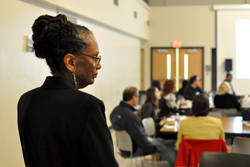
Linda Lane: Looking at Pittsburgh Public Schools’ future down at the students’ level
Dr. Linda Lane isn’t one for long strides. The 62-year-old superintendent of Pittsburgh Public Schools carries herself with small but swift steps as she sweeps through the halls of Colfax K-8 in Squirrel Hill. She’s small and thin, and her hair is braided in a practical, keep-it-out-the-way style. Black-frame glasses hang off her nose and her lips are curled in a polite smile.
Flanked by a single staffer, Colfax Principal Adam Sikorski and, for today, a reporter, Lane does not have an imposing presence. As she passes through the early-grade classrooms — entering but never exactly interrupting — the students over whose shoulders she stands probably wouldn’t guess she outranks their teachers and even their principal.
“This is home for me,” Lane says, before stepping into a first-grade classroom. “This is what I taught.”
In addition to offering an on-the-ground look at the mammoth enterprise she oversees, this bi-monthly ritual of touring a school is a “stress reliever for me,” Lane explains. “I just basically like kids. It’s not every day I get a chance to touch a child directly.” Lane stops to speak to several during the visit. Peering over a fourth-grader and eyeing his composition on a basketball play called the box offense, she asks him to explain it to her. He does, in that slow, automatic way children explain something they know in detail but realize is foreign to grown-ups.
Later, after the entourage makes its way to the middle school, three girls, congregated by lockers between classes, ask Sikorski about lifting the dress-code ban on hooded sweatshirts indoors for a day so they can make a statement about Trayvon Martin, the hoodie-clad Florida teen shot and killed by a neighborhood watch member.
“It seems right, if we can [also] have a pajama day just for fun,” one of the girls reasons as Sikorski nods along. Lane gives them an update on the news story, after hearing NPR’s “Morning Edition” while driving in.
Once the girls make their way to class, Lane looks towards a window in the hallway that gives a view of Colfax’s newly renovated gymnasium. “I had to explain to parents this would not be done in time,” she says. “I will never forget that.”
All motion has stopped. Lane’s no longer back “home” in an elementary school and she‘s certainly not a tourist here. She’s a superintendent of an urban school district with all the frustration, responsibility and hard-won hope that entails.
Linda Lane was raised in Iowa, where her father had a job she herself would later fill, deputy superintendent of Des Moines Public Schools. Before that, she was an elementary-school teacher, then moved on to a succession of administrative posts in the Des Moines district. Along the way, she earned her specialist and doctorate degrees from Drake University. In 2007, she was hired as deputy superintendent of Pittsburgh Public Schools, and when Superintendent Mark Roosevelt left at the end of 2010, Lane moved into the top job in the district.
Like seemingly every public institution, Pittsburgh Public Schools was facing a budgetary crisis. Thanks in part to ballooning pension costs and the expenses imposed by charter schools, the district faced a $22 million shortfall in its $530 million budget. By 2014, it would begin eating up its basic cash reserves.
Thus, a few months into the job, Lane had to oversee some grating decisions. The district laid off 147 central office employees. Now 400 teachers are expected to lose their jobs as seven schools are closed, . The closures are also due to a reduction in enrollment of more than 3,000 students from 2007 to 2011. Still, class sizes will increase across the district. Grants helped the district under Lane’s watch, but many were for such specific purposes (like teacher training) that they cannot help the district were it hurts the most.
“Trying to balance competing agendas and competing politics can be a struggle,” Lane says. “I knew that was part of the job but I didn’t know to what extent. I’m sort of a get-my-head-down-do-the-work kind of person and there is so much of [my job] involved with working with other people and trying to explain and persuade so we can be running in the same direction.”
Lane says 35 to 40 percent of her time is spent figuring out how and where to spend the district’s money and where to make cuts, which she says can be a distraction from the district’s most essential work.
“Yeah, it’s important to balance that budget — clearly, we have to do that — but that’s not why we exist,” she says, “and if we are a district that has a balanced budget but doesn’t meet the needs of its students, there is no reason for us to exist as a school district.”
She says she looks to the staffs of the individual schools to “keep the main thing the main thing.” And she points out that, during her Colfax tour, Principal Sikorski gave a high five or a fist bump to nearly every kid he encountered. He knew their names, their after-school activities and even the recent track-and-field accomplishments of one of their siblings.
“That to me is incredible,” says Lane. “Walking down the hall, he speaks to the children. He doesn’t think, ‘The superintendent is here, I’m too busy to say good morning.’ It’s those kind of behaviors that are to me tremendously important.”
A defining trial of Lane’s brief tenure was the revamping of Westinghouse, a long-failing high school in Homewood. Last fall, the district remade the school to serve grades six through twelve, put its academic schedule in trimesters, replaced a slew of the staff and allowed for some classes to be separated by gender.
When it opened, class schedules and curriculum hadn’t been decided and a lawsuit threat from the American Civil Liberties Union abruptly ended single-gender classes. Chaos reigned for the entire fall, as kids’ schedules continually changed and a new principal was appointed in November.
Lane says she asks herself: If she could do it all over again, would she have gone with that plan for Westinghouse? She is “still mulling it,” she says, adding, “I have to remind myself and remind others that Westinghouse was not a successful school this time last year.”
Rumors abound that Lane’s tenure will be brief, and some have focused on her health. Last November, she let it be known she is being treated for an unnamed “manageable health condition” and insisted she will fulfill her three-year contract, of which she is now in the middle. She also pointed out that, since she started at Pittsburgh Public Schools in 2007, she hasn’t missed a day of work.
Lane even mentors a third-grader at Weil K-5 in the Hill District as part of a weekly early-grade reading program. Lane says she “couldn’t be out asking people to do the early-grade reading if I wasn’t out doing it.”
Photographs of Linda Lane taken at a recent Superintendent’s Teacher Round Table, andcopyright Brian Cohen.



